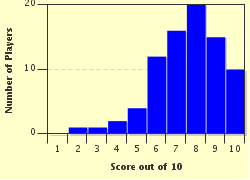Quiz Answer Key and Fun Facts
1. Matthew 5:13 states, "You are the salt of the earth; but if the salt has become tasteless, how can it be made salty again? It is no longer good for anything, except to be thrown out and trampled under foot by men." (New American Standard Bible)
Who does Jesus call the salt of the earth?
2. If Christ's followers take this preaching literally, the results could be very gruesome.
Jesus states in Matthew 5:27-30 that if your eye or hand causes you to stumble or sin, then you should cut it off your body and throw it away. Ouch.
What specific sin does Jesus refer to in the verses?
3. Matthew 7:1-5 seem to be some of the most often quoted Bible verses there are. The New American Standard translation states it as follows.
"Do not judge so that you will not be judged. For in the way you judge, you will be judged; and by your standard of measure, it will be measured to you. Why do you look at the speck that is in your brother's eye, but do not notice the log that is in your own eye? Or how can you say to your brother, 'Let me take the speck out of your eye,' and behold, the log is in your own eye? You hypocrite, first take the log out of your own eye, and then you will see clearly to take the speck out of your brother's eye."
The "speck" and "log" are metaphors for sins.
A common interpretation of these verses implies that Christians shouldn't ever judge anyone for doing wrong. However, does this interpretation contradict other parts of the New Testament?
4. In Matthew 12:40, Jesus alludes to a fishy Old Testament prophet. Which one?
5. According to Matthew 15:21-28, a Gentile woman asks Jesus to heal her daughter. At first, He doesn't. He says that it isn't good to take food from the children (Jews) and give it to the dogs (Gentiles).
What is the ethnicity of this woman?
6. According to chapter three of John's Gospel, Nicodemus understands that Jesus's teaching about being born again is spiritual and not physical.
7. In John 4:7-14, Jesus tells a metaphor about salvation to a Samaritan woman.
What does He compare His gift of salvation to?
8. Once again, Jesus uses a metaphor. In John 10, He refers to His followers as which kind of farm animal?
9. Revelation 5:4-5 proclaim Jesus to be the what of Judah?
10. Revelation 19:7-9, which, according to verse 9, are true words of God, use figurative language to describe the relationship between Jesus and His church (the real, truly saved believers).
What feminine term is used for the church?
Source: Author
Ceduh
This quiz was reviewed by FunTrivia editor
looney_tunes before going online.
Any errors found in FunTrivia content are routinely corrected through our feedback system.

